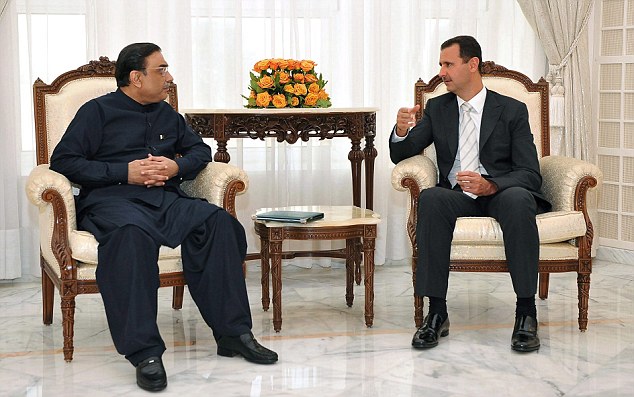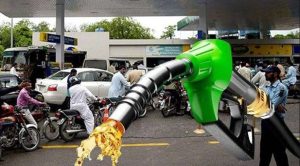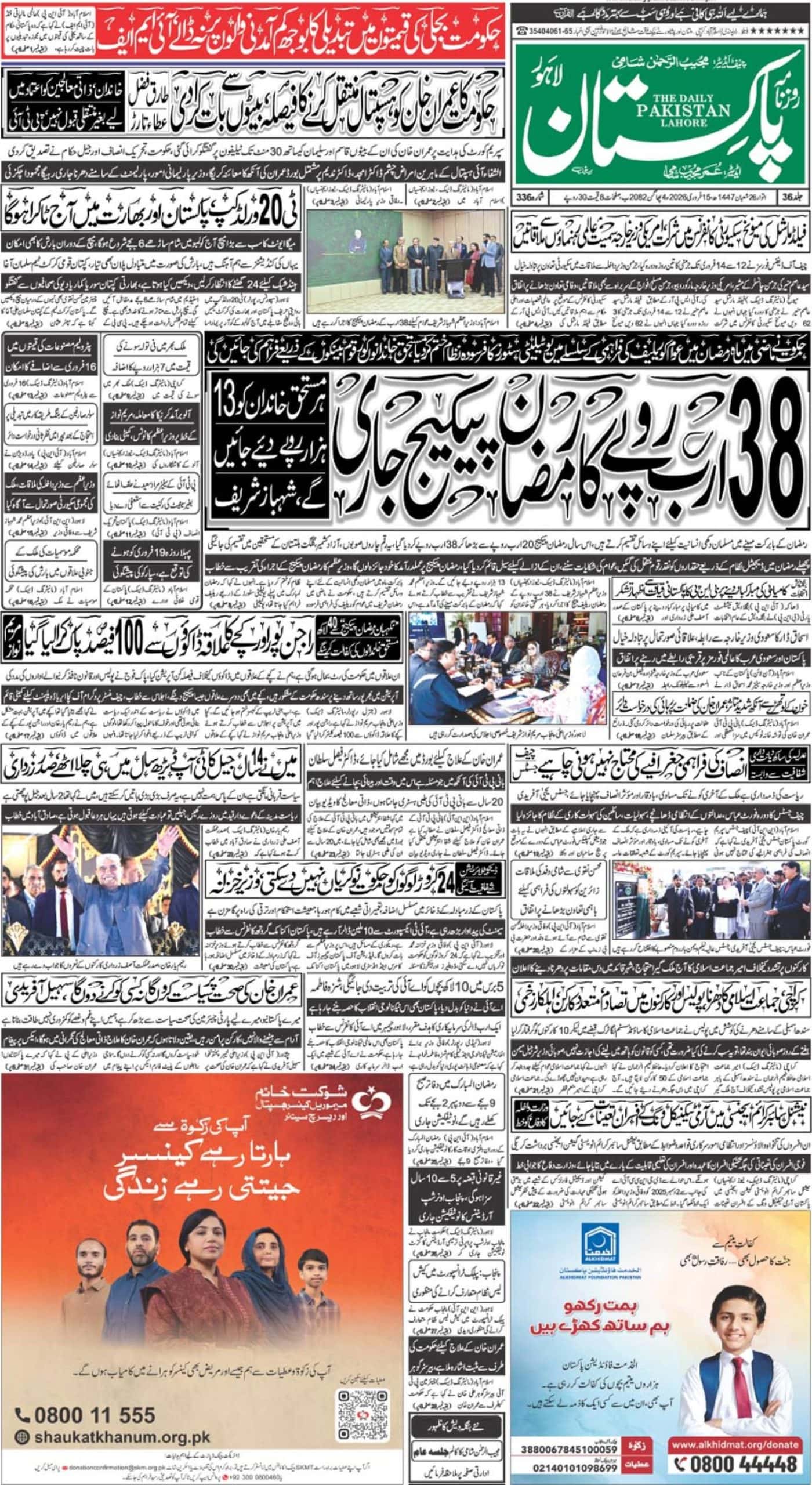Pakistan has been abstaining from UN Security Council resolutions against excessive use of force by Syrian dictator Bashar al-Assad. Unprecedentedly, Islamabad did not stand with the rest of the world against his repeated use of chemical weapons that killed hundreds of Syrian children and women. More recently, the regime destroyed Damascus’ water purification and supply plant to blame it on the opposition factions. Islamabad remains as apathetic as it always was.
In an ideal world, such strong allegiance to a regime results from a time-tested win-win relationship. Not so in the case of Pakistan’s unrelenting support for Syria’s Assad regime.
The bilateral relations have remained friendly since its independence but could never be called “strong”. The bloody coup of February 1966 brought to power Arab Socialist Ba’ath Party and left 400 Syrians dead. Hafez Al-Assad’s coup was widely hailed by the Soviet-led bloc including India, while Pakistan observed the developments cautiously. Standing by Palestine and refusing to recognize Israel as a legitimate state, Pakistan secretly sent military men and pilots to fight in the 1967 Arab-Israel war and nearly every other large-scale conflict with Israel. Pakistan pilots were flown to Iraq and then to Damascus and other bases in Lebanon, Jordan or Egypt. Thus far, Assad’s Syria neither supported Pakistan in the Jammu and Kashmir dispute with India nor did it condemn the Indian proxy war in East Pakistan through Makti Bahni.
In Yom Kippur or Ramadan war of 1973, Pakistan not only deployed troops for protection of Damascus city but also trained the Syrians. Additionally, Islamabad also provided naval support as well pilot to the Syrian military. Though Pakistani pilots were not trained to fly MiG-21s, they shot down Israeli fighter jets, their aggressive patrols averted Israel attacks on many Syrian, Lebanese and Egyptian installations as well as cities. Pakistan’s ace fighter pilot late MM Alam was also amongst the heroes who accepted military decorations but returned any material remunerations.
This was a time when Pakistan had recently been dismembered, and Zulfiqar Ali Bhutto was trying to woo friends globally. The participation in wars against Israel boosted his image in Pakistan too. In 1974, Hafez Al-Assad visited Lahore to attend the summit meeting of Organization of Islamic Cooperation.
In Bhutto, the Ba’athist leaders Gaddafi, Saadat and Assad found an inspiring socialist who was trying to distance the country from the Western bloc. After Bhutto’s fall, Saadat took a more pragmatic approach and the relations between Pakistan and Egypt remained on course. However, Gaddafi and Assad reacted angrily. After Bhutto’s hanging, the bitterness became more pronounced.
Gaddafi and Assad went to babysit Al-Zulfikar, the first terrorist organization led by Pakistanis, none other than Zulfiqar Ali Bhutto’s sons – Murtaza and Shanawaz. Infuriated by their father’s assassination, the playboys took refuge in Kabul and planned various acts of sabotage against Pakistan. It is well-known that funding from Al-Zulfikar’s terrorist activities also came from Syria besides other countries like India, Afghanistan and Libya. Murtaza successfully executed the hijacking of a Peshawar-bound Pakistan International Airlines aircraft from Karachi in March 1981. The flight was first diverted to Kabul as the hijacking lasted for 13 days. Murtaza’s men, inspired by hijackings by the Palestinians and advised by Afghan intelligence agency KHAD, took the plane to Damascus where Hafez Al-Assad’s military eagerly welcomed the hijackers. While Assad’s men treated the hijackers as state guests, the Pakistani government was asked to release 50 Bhutto loyalists from jail or six American passengers aboard would be shot dead.
When Major General Rahim Khan tried to negotiate in Damascus, the Syrian government rudely refused to cooperate with the Pakistani officials against the Al-Zulfikar hijackers. General Zia relented and released the political activists. A special plane flew to the Syrian capital with freed political activist in exchange for innocent passengers of flight PK-326.
Protected, funded and trained with funds and expertise from the Afghan, Libyan, and Syrian governments, Murtaza planned to take Zia’s life to avenge his father’s. The Russian missile missed the presidential plane in 1982 while the other attempts could not take off or were foiled prematurely. While Murtaza and Shahnawaz shuttled between Tripoli, Damascus and Kabul to hatch terrorist activities, Benazir Bhutto always condemned their actions in private as well as in public. Both eventually settled in Cannes in France with their Afghan spouses.
Pakistan’s relations with Syria are so far marked with Assad’s unequivocal support for terrorists, a few of whom were given refuge in the country too. Many Al-Zulfikar operatives preferred to live in Tripoli, though.
After Benazir Bhutto’s return to Pakistan from exile in 1985, Zia feared a repeat of Baathist interference in domestic affairs. In 1987, the Pakistani leader made a surprise state visit to Damascus to meet Hafez al-Assad. Syria reportedly got the message and did not intervene in political matters.
“Had Pakistan adopted Arabic, the language of the Quran, as the national language, the lingual rifts and political divisions and anarchy would not have occurred. Pakistan would have remained a united country,” said Assad reportedly told a visiting delegation later.
When Benazir Bhutto was the prime minister in 1993, Syria softened its pro-India policy a bit and for the first time acknowledged Kashmir as ‘a disputed territory and a bilateral dispute’. President Asif Ali Zardari, widower of Benazir Bhutto, paid a two-day visit to Syria in January 2010 and called on Bashar al-Assad who had succeeded his father. Both sides agreed to revive relations to those during the Zulfiqar Ali Bhutto’s era.
On August 10, 2010, President Asif Ali Zardari stopped over in Syria on his way back home from London. Though nothing significant emerged from the visit for Pakistan or Syria, the contacts deepened between the Iran-leaning PPP-government as well as Tehran-sponsored Nusehri regime. As back as May 2013, Zardari met the visiting Syrian deputy foreign minister in Karachi. Unlike most other Muslim countries, the Peoples’ Party-led government neither withdrew its ambassador from Syria after endless atrocities by the regime against its people nor condemned supported UN resolutions. In February 2015, Senate Chairman Syed Nayyer Hussain Bokhari led a three-member Senate delegation to Syria and called on Bashar al-Assad. The foreign ministry spokesperson at the time downplayed the development terming it a private visit.
Meanwhile, certain Iran loyalists have been recruiting Pakistanis from Balochistan’s Hazara community, Gilgit-Baltistan and tribal regions, such as Kurram agency, to fight for the Assad regime in Syria. In 2016 alone, over 300 Pakistanis have been killed fighting in Zeinabiyoun unit alongside Hezbollah, Iraqi militias, Iran’s IRGC and Assad’s military. They are buried in Iran with their names, pictures and countries mentioned in the funeral. Even their gravestones have been inscribed with their identity and nationality. It also no secret that the deceased’s families are paid monetarily during the combat and posthumously. Should it not bother the most outspoken critics of extremism and failure of the National Action Plan? How are far these returning extremists different from the ISIS, Taliban or al-Qaeda operatives?
Ironically, the Pakistani mercenaries are fighting for the Assads, who never favored Pakistan except for liking the Bhutto family. Zardari pursued a policy of appeasing Iran, which has been supporting Syria’s minority oppressive regime for years. Despite the death of half a million people and more than half of the Syrian population becoming refugees, Pakistan is amongst those few countries where Assad still maintains an embassy. What has been holding Islamabad from declaring the ambassador persona non grata and condemning the proven use of chemical weapons and heinous crimes? Most likely, the timid policy Islamabad adopts on Syria aims to appease Iran and Russia while forgetting that the Assads never stood shoulder to shoulder with Pakistan at any occasion of need while Pakistani soldiers were the ones who had protected Syrian airspace, maritime and land border amidst bitter wars.














